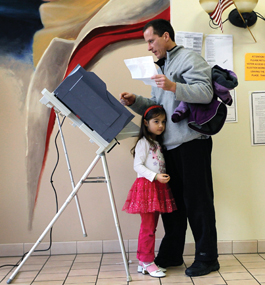Firstborn Daughters Awaken Fathers to Gender Inequality

Joe Raedle / Getty Images
by Lawrence Goodman
In 2018, more American women ran for elected office than ever before. And dads with firstborn daughters may have boosted their odds of winning.
New research from Brandeis and the University of Massachusetts points to a “first-daughter effect,” suggesting that fathers are more likely to vote for female candidates if their first child is a girl. The research also found that dads with firstborn girls are more likely than other fathers to support gender equality.
Jill Greenlee, associate professor of politics, and women’s, gender and sexuality studies, conducted the research along with several colleagues at UMass Amherst. She believes first-daughterhood may compel dads to look at the world through their daughter’s eyes.
“It appears there’s something about entering fatherhood with a female child that makes men think about gender in a different way,” Greenlee says. “Perhaps they recognize gender discrimination for the first time. Or it may be they develop new insights into the ways that gender shapes opportunities differently for girls.”
Subsequent daughters and firstborn (or subsequent) sons do not move the needle on a dad’s political thinking. “We know from studies by other researchers that men spend more time with their firstborn daughter than with subsequent daughters,” says Greenlee. “So it may be that firstborn daughters are uniquely situated to influence their fathers by virtue of the time they spend together.”
Dads also have “less-scripted” relationships with their daughters than with their sons, says Greenlee, so dads may feel freer to spend their time differently with daughters than with sons. “Research in political science shows that first experiences in politics tend to have a bigger impact on individuals,” she says. “The first time people vote, for example, leaves a big imprint. Your first experience of becoming a parent may also have a lasting impact.”
In one study, published in the journal Political Behavior, Greenlee and her colleagues looked at the support among fathers for Hillary Clinton’s 2016 presidential campaign. Traditionally, men have been less supportive of female politicians than women. Clinton directly appealed to dads, saying in a debate during the Democratic primary, for example, that, “finally, fathers will be able to say to their daughters, ‘You, too, can grow up to be president.’”
Using 2016 survey data collected from 1,500 voters by the Cooperative Congressional Election Study (CCES), they also found that the first-daughter effect is stronger in fathers who are Democrats than in dads who are Republicans.
Greenlee’s research team discovered that fathers with firstborn daughters showed “significantly and substantively” increased support for Clinton, after controlling for the influence of partisan preference, education, religion and a range of other factors.
The researchers also ran a survey experiment with a fictional candidate named Molly Smith, running to become the first woman to represent Minnesota’s 10th Congressional District. Her appeal to voters echoed Clinton’s by emphasizing expanding opportunities for “our daughters.” Fathers of firstborn daughters exposed to the “Clintonesque” appeal were significantly more likely to support Molly Smith than fathers of firstborn sons.
“Clinton’s appeals to fathers of daughters were indeed effective in the 2016 election,” the authors wrote. “Ultimately, our results suggest that having a first daughter may be a transformative experience that leads men to […] apply this newfound perspective to their candidate evaluations and vote choices.”
Again using CCES data from 1,500 voters, the researchers also looked at dads’ views on three issues: policies “requiring schools, colleges and universities to provide equal athletic opportunities to girls and boys”; policies “that would address the gender gap in income in the United States”; and policies to support “better enforcement [of laws] that outlaw sexual harassment in the workplace.”
Support for each of these policies was measured on a five-point scale, from “strongly oppose” to “strongly support.” Dads with firstborn daughters showed stronger support for the policies. Subsequent daughters failed to affect the political views of their fathers.
Interestingly, the first-daughter effect did not impact men’s views on immigration or the environment, but it did tilt them more in favor of gun control.
The study, published in Public Opinion Quarterly, concluded, “It may be that just as the experience of having a first daughter awakens fathers to the importance of policies to promote gender equality, it brings greater awareness and support of measures to safeguard women against gendered violence.”
Overall, the research points to one way female candidates may be able to identify men inclined to support them.
